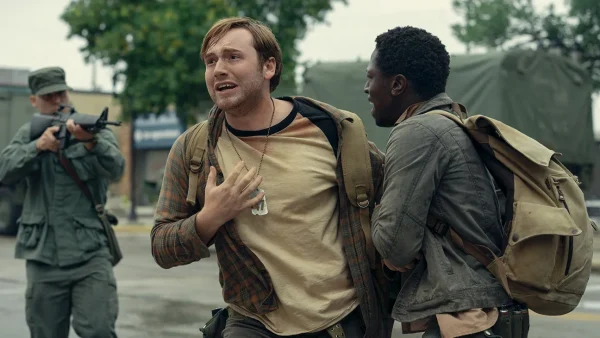Fleet Foxes’ ‘Shore’ is a breath of fresh air for autumn
October 14, 2020
Seattle folk-rock band Fleet Foxes surprise-released their fourth studio album “Shore” on Sept. 22 in accordance with the autumnal equinox, the opening lines of the album appropriately being “Summer all over/Blame it on timing.”
The album signifies a change of season, for the world and the band themselves, gently guiding listeners into the fall for an experience as mellow as a day at the beach.
“Shore” is familiar, with Fleet Foxes’ distinct sound, existential themes and imagery of the sun and nature that they have been known for since their first EP, “Sun Giant,” but leans into a more hopeful side of things, and feels like one of the more life-affirming projects of the band’s discography.
Lead singer Robin Pecknold is to credit for much of the album, performing and writing almost every song (which is also an effect of COVID-19 making things more difficult for bands to meet up).
Despite the hopeful drumbeats and guitar riffs matched with Pecknold’s soothing voice, there is still much to be said for the weight this world has on Pecknold.
It is an incredibly timely album, meaning it has to have mention of the feelings of impending doom many people feel in the world of climate change, political unrest and a pandemic, giving the album a certain heaviness despite it being one of the band’s brighter albums.
The album’s opener, “Wading in Waist-High Water,” is a wonderful prelude into the work as a whole. The subtlety of the lyrics and the fluidity of the production leans listeners into waves that flow aptly like the “Shore.” It is sung in the calming and smooth voice of Pecknold’s college friend, Uwade Akhere, who also sings on the track “Can I Believe You.”
One of the shining songs on the album, recalling Fleet Foxes’ signature existential questioning to the void, “Can I Believe You” includes the background vocals of 400 to 500 voices that were sent in from Instagram, according to Pecknold via Apple Music, which creates a choir of voices lifting Pecknold’s cries of wanting to trust, wanting to believe, singing: “Can I believe you/I want to need you.”
“Sunblind,” like the title implies, is the most upbeat, catchy track on the album. It sounds like a song that would be playing behind someone basking in the sun, feeling it warm them.
Pecknold writes the song to the many dead musicians that have influenced him throughout his life and career; describing the track to Apple Music he stated: “I wanted the album to be for these people, I’m trying to celebrate life in a time of death, trying to find something to hold on to that exists outside of time, something that feels solid or stable.”
“Sunblind” is the core of the album, with Pecknold shouting out Robert Swift, Jimi Hendrix, Arthur Russell, John Prine, and Bill Withers.
His influences are present throughout the tracklist, but especially in “Cradling Mother, Cradling Woman,” which includes a sample from Brian Wilson’s “Don’t Talk (Put Your Head On My Shoulder).”
Pecknold also eulogizes one of his heroes, Victor Jara, a Chilean singer and national hero, in the gentle track “Jara” that overtly covers multiple injustices occurring during the pandemic.
He references the number of people who have had to vacate their homes due to the economic crisis: “First sight of the first good morning since you’ve been out of town/First time any violet omens don’t shadow me around/So you want part of the great white tyrant, of ghost after ghost?”
While tackling the heavy emotions of being in New York during the COVID-19 crisis, Pecknold was able to produce a light and airy track to combat the lyrics, leading directly to the next soft-rock track, “Featherweight.”
In an examination of the tumultuous year, he sings, “May the last long year be forgiven/All that war left within it,” a message that encapsulates the time in which the album was released.
The album also includes some of the catchiest and most exciting songs of the Fleet Foxes’ catalogue.
“Young Man’s Game” is an enthralling and goofy track about growing out of the naivetés of being young and insecure. Pecknold even has a child sing along with him, adding to the whimsical and sweet quality of the song. It doesn’t sound like anything the band has put out before and adds an exciting energy to the overall work.
The incredible “Maestrana,” an ode to missing people during the pandemic, also shows this other side of Pecknold, a side that dances through the wonders and anxieties of life.
“A Long Way Past the Past,” once again shows the strong lyricism that keeps listeners at the ready while hearing a Fleet Foxes’ album. Pecknold’s falsetto leads the listener on a journey through his idealization of the past and the ways he feels stuck in it, a lovely sentiment in a time where the past is romanticized daily.
“I made my own way through,” a joyous proclamation that Pecknold breezily sings, gives the song a layer of triumph and readiness, leading to the final lines: “I’ll be better off in a year or in two.”
This easily leads to the short, understated gem: “For A Week Or Two.” This track feels effortless, with birds chirping in the background and lyrics that seem to have come straight from a journal.
Pecknold sings “Water stands/Waves just pass through it/Like something moves through you,” holding true to the central themes of water, flowing and changing.
The track coming directly after it focuses on these themes as well, “I’m Not My Season.” The stunningly soft look into the fleeting emotions and moments of life, pinches at the heartstrings and affirms listeners, “you’re not the season you’re in.”
“Shore” encapsulates gratitude of the natural world, especially in “Quiet Air/Gioia,” which directly references climate change and the catastrophic effects humans have on the environment.
Pecknold sings: “Quiet air, quiet in blue/Quiet ice-melt, summer-red cedar quiet air might terrify you/Quiet now though soon enough louder,” referencing the invisible threat of climate change that will soon be apparent. The song sounds urgent with drums that sound like ominous footsteps, a chase much like the climate crisis.
Following this whirlwind is the relaxing “Going-to-the-Sun Road,” a stark change of mood central to the waves of the album as a whole. The track gives a glimpse into a dreamy drive on a Montana road, enchanting listeners with an outro sung in Portuguese by the extremely talented Tim Bernardes.
Possibly one of the most Fleet Foxes-esque tracks on the album is “Thymia,” a short acoustic track that sounds like it could be straight out of 2011’s “Helplessness Blues.”
“Thymia” showcases the imagery Pecknold employs in his lyrics that throws listeners into a setting and feeling, cascading with metaphors and natural imagery.
The track is like a breath of fresh air just before the finale of the project, a time to pause and reflect. Pecknold refreshes listeners, softly singing in a sort of declaration: “Never failed us, even losing daylight/Daylight.”
Pecknold wraps up “Shore” with its title track, a just epilogue to what might be one of his greatest projects to date.
The song closes the album in a crash of cymbals and drums, enclosing like waves. Pecknold distantly and indistinctly sings over distressed noise, coming clear to the proclamation: “Now the quarter moon is out,” repeated and said with more power each time.
Fleet Foxes’ “Shore” is a timestamp of the current life of frontman Robin Pecknold, as well as a timestamp for a world in the time of a crisis. The album reads like a letter of hope and sounds like a breath of clean, cool air.
“Shore” grapples with the pain of life as we currently know it, while holding space for the hope for the future and the beauty of the present. The autumnal equinox, at least to Fleet Foxes, holds hope and joy on the horizon.













